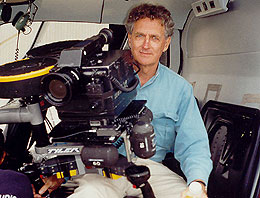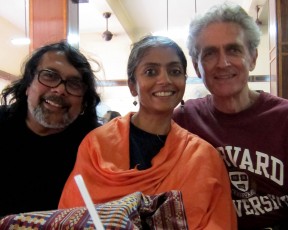Acclaimed cinematographer and film maker Thomas Michael Cowan is a man of truth. Of that moment when stiff pretences and masks are peeled off and the real person emerges. So he pays a sudden compliment. Caught off-guard, I react and he amusedly observes, “See? I get a smile!”
It is a game he plays often with the film narratives he directs. He is not interested in the make believe, sanitised versions of life on celluloid. He wants the pith of life, stories that are lived and not imagined, reactions that are raw and not premeditated. Real down to frown lines, tear marks. And spontaneous smiles. The impulsive acts that change the course of lives and speak of dormant dreams.
As a film maker and story teller, Cowan is interested also in two key things. The foreground and background. The personal story of a protagonist. And her/his social background. One is incomplete without the other. He says, “People are connected to stories and stories to backgrounds. When there is no disruption between a background and a story, there is no disruption between an audience and a film.”
He follows what has come to be known as the Local Emotion credo of film-making (as opposed to just a one note motion picture idea) where personal stories are framed in their environs and told to the audience.
In his quest for truth, he has been all over the world. From being the serendipitous choice to be the director of photography in the crew of Pattabhi Rama Reddy’s pathbreaking Kannada film Samskara to working in many continents, in many genres of film making. However Samskara, a film that won Best Feature (President’s Award) and many international prizes including the Silver Lion at Locarno, rooted a part of Cowan’s soul in the India. He even co-wrote and directed the feature, Wild Wind (Chanda Maruta).
But there is not one milieu but many that run through him like a river. Though born in Wangaratta, Victoria, Australia, he has filmed things as diverse as Africa’s Elephant Kingdom for Michael Caulfield, the acclaimed money spinner Antarctica and China – The Panda Adventure (as a second unit director) in his initial years.
Also Survivor 2 for which he got an Emmy nomination and Disney Corporation’s The Young Black Stallion. More about his vast body of work can be found on http://www.innersense.com.au/mif/cowan.html.
But when I meet him at theatre personality Kirtana Kumar and musician Konarak Reddy’s home in Bangalore, I want to know about this thing he has for true to life cinema. And also just why he is in Bangalore. Well, Konarak is the son of late Pattabhi Rama Reddy and sometime back he and wife Kirtana started experimenting with, as she says, “The process of engaging with lay people and their stories and using this in theatre-making.” A theatre production called The Wedding Party followed. Something similar to what Cowan does in cinema.
So naturally Cowan, Kirtana and Konarak are now collaborating on a feature film called Bangalore Love Story which says Kirtana is a, “continuation of The Wedding Party in several ways – process and the persons involved.”
Cowan who has already worked on a similar and hugely acclaimed project called Orange Love Story in 2004, says he is in India to film among other things, “the conflict between youth and age, materialism and spirituality….all bound up in one love story. The real obstacles are within. Love is not all peaches and cream. Love is the central struggle in the human narratives. Sometimes, love is about giving something up within us to find something else or someone else. Maybe one has to sacrifice ego, fame, money, familial approval or notions of independence for love.”
For this film project he is looking for people, “not necessarily actors who are willing to express themselves, their lives and to share a love story that means something to them.” What will emerge is a “tapestry of different stories with some hilarity. And sweet, tender, painfully truthful moments.” For this project, he would like people who are “real” and who do not just “pantomime” in a larger-than-life reality that popular cinema projects.
He is quick to explain that he is not talking about finding external realism but to tap into the “mystery of a character, unravelling that mystery, looking at what causes conflict.” A film for him is like a “detective story” where instead of finding clues leading up to a perfect denouement, you end up “discovering a person.”
The most interesting moment for him as a film maker is when a character faces a dilemma, a moment of decision. That process from conflict to resolution is what he likes his actors to react to. In artificially orchestrated cinema he misses the “grace of ordinary lives, the beauty of reality when a kid plays with a stone or a puppy.”
“Truth is magical. If you are pretending to be a character, you can’t be that person. The purpose of every story, every life is to look for answers about who we are. And to ask who am I? What does God want of me? I look for actors who have the courage to live a moment without first working out how it will happen. Actors have to practice being open,” says Cowan.
An individual’s quest to find the truth of his existence, he says gets diverted by many things, “One gets seduced by diversions like materialism, fundamentalism, violence.” Filming Survivor-2 he says was the exact opposite of the kind of work he does because even though the series has reality as its hook, it is edited and manoeuvred to a climax in each episode to give the audience, an insight into the most, “horrible, lowly traits and the worse motivations of human beings. What we learn from the facile stories is that most people are rather dreadful.” A smile follows.
Samskara however he says, “was one of those magical concurrences where many talented people come together..work with mutual generosity and do wonderful work.” The film sought him out as if he was made for it. Cowan remembers sitting on the beach with artist SG Vasudev while visiting the Cholamandala artist’s village. Vasudev who was the art director of Samskara told Cowan that Pattabhi Rama Reddy, the director was looking for a cinematographer.
What followed was easily one of the most creatively fulfilling synergies, a 25-year-old could hope to be a part of. Though he went on to direct many films independently subsequently (Journey Among Women, The Office Picnic, Promised Woman and Sweet Dreamers and others), this experience has a lasting cadence.
In his own life he says, the impulsive acting out of deep creative desires has some times worked out and sometimes not. “Like Mick Jagger sang, you can’t always get what you want but if you try.. you sometimes get what you need,” he smiles.
Anything that you rehearse, he says, becomes stilted and so life on film and when lived should be improvised. And should have an element of surprise. He shares, “I was introverted as a little boy. Film making has allowed me to practice being open. And to understand that it takes all kinds of people to make a movie and a life.”
And so he lives his life not in the pursuit of perfection but completion. And moments of truth.
Reema Moudgil is the author of Perfect Eight (http://www.flipkart.com/b/books/perfect-eight-reema-moudgil-book-9380032870?affid=unboxedwri )








I loved this interview feature because of its sheer transparency. I guess when you interview ‘good human beings’ the effortlessness shows 🙂